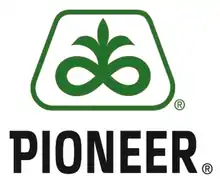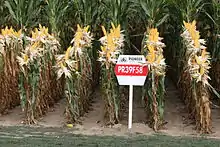Pioneer Hi Bred International
Pioneer Hi-Bred International, Inc. is a U.S.-based producer of seeds for agriculture. They are a major producer of genetically modified organisms (GMOs), including genetically modified crops with insect and herbicide resistance.
 | |
| Type | Agriculture/subsidiary |
|---|---|
| Industry | Agriculture |
| Founded | Des Moines, Iowa (1926) |
| Headquarters | , United States |
Area served | world |
Key people | Jim Collins (CEO of Corteva Agriscience) |
| Products | Hybrid and varietal seeds |
| Services | Granular Inc. |
| Revenue | $4.3 billion USD (2012) |
Number of employees | 12,300 (estimate) |
| Parent | Corteva |
| Website | www.pioneer.com |
As of 2019, Pioneer is a wholly owned subsidiary of Corteva Agriscience.
History
In 1926, farm journal editor and future U.S. Vice President Henry A. Wallace, along with a group of Des Moines, Iowa businessmen,[1] founded the Hi-Bred Corn Company. Wallace had been experimenting with hybridization of corn and became convinced that hybrid seed corn would become important.[1]
Timeline
- 1924 Henry Wallace begins selling 'Copper Cross', an early commercial hybrid seed corn.
- 1926 Hi-Bred Corn Company is founded in Des Moines, Iowa, with $7,000 in capital.[2]
- 1931 Roswell Garst agrees to produce/distribute seed. The following year Garst partners with Charles Thomas to form the Garst and Thomas Seed Corn Company.
- 1935 "Pioneer" was added to the name of the company to distinguish it from other hybrid corn companies. The full name is "Pioneer Hi-Bred Corn Company".
- 1936 Pioneer founds Hy-Line Poultry Farms (later Hy-Line International) to produce hybrid egg-laying chickens. Henry B. Wallace (son of Henry A. Wallace) serves as president of Hy-Line until 1975.
- 1949 Pioneer reaches annual sales of one million units.
- 1964 a research station is established in Jamaica.
- 1970 The company name is changed to Pioneer Hi-Bred International, Inc.
- 1973 Becomes a publicly traded company.
- 1973 Pioneer obtains a soybean product line through the purchase of Peterson Seed Company.
- 1975 Purchases Lankhartt and Lockett companies (cotton seed business).
- 1977 Pioneer acquires Microbial Products division to develop bacterial strains for inoculation into silage.
- 1978 Hy-Line International is spun off.
- 1981 Pioneer becomes the market-share leader in North America corn sales.
- 1982 Annual sales pass the US$10 million mark.
- 1983 The name of the soybean product line was changed from Peterson to Pioneer.
- 1991 Pioneer purchases 2 million shares and establishes a partnership with Mycogen Seeds to develop Bt insect resistance in corn, sorghum, soybean, canola, sunflower, and other seeds. Pioneer sold the shares in 1998. Pioneer becomes the number one brand of soybeans in North America.
- 1992 Pioneer paid $450,000 to Monsanto for rights to genetically modified soybean seeds that are resistant to RoundUp herbicide.
- 1993 Pioneer paid $38 million to Monsanto for rights to Bt corn that is resistant to European corn borers.
- 1995 Pioneer stock is listed on the NYSE as PHYB.
- 1996 Pioneer acquires 20% stake in Sunseeds Co. (a hybrid vegetable seed producer) in exchange for Pioneer's vegetable seed operation.
- 1997 DuPont acquires a 20% stake in Pioneer and the companies form a joint venture called Optimum Quality Grains LLC.
- 1999 DuPont purchases the remaining 80% of Pioneer for $7.7 billion.[2]
- 2006 DuPont and Syngenta announce GreenLeaf Genetics LLC, a joint venture to market seed genetics and biotech traits.
- 2010 DuPont and Syngenta end their joint venture, GreenLeaf Genetics LLC, with Syngenta retaining complete ownership.
- 2012 Pioneer announces update to business name to be DuPont Pioneer.
- 2012 Lawsuit regarding pesticides and dust by 200 residents of Waimea, Kauai against Pioneer Hi-Bred International, a DuPont company.[3]
- 2012 DuPont Pioneer completes acquisition of Panaar Seeds [4]
- 2013 DuPont agrees to pay Monsanto Co. at least $1.75 billion in a new licensing deal and both companies have agreed to dissolve their bitter legal battles over rights to technology for genetically modified seeds.[5]
- 2014 S&W Seed Company announces closing of acquisition of DuPont Pioneer alfalfa research and production assets.[6]
- 2017 Merges with Dow Agrosciences to form the Agriculture Division of DowDuPont.
- 2019 The agriculture division is named Corteva and spun off from DowDuPont.[7]
Today


The headquarters of DuPont Pioneer are located in Johnston, Iowa, with additional offices around the world. Pioneer produces, markets and sells hybrid seed corn in nearly 70 countries worldwide. The company also markets and sells hybrids or improved varieties of sorghum, sunflower, soybean, alfalfa, canola, rice and wheat, as well as forage and grain additives. Worldwide, Pioneer sells products through a variety of organizations, including wholly owned subsidiaries (Curry Seed, NuTech Seed, Hoegemeyer Hybrids, Doeblers Seed, Seed Consultants Inc, Terral Seeds, AgVenture Inc) joint ventures, sales representatives, and independent dealers (Burrus Hybrids, Beck's Superior Hybrids).
Pioneer makes and sells hybrid seed and genetically modified seed, some of which goes on to become genetically modified food. Genes engineered into their products include the LibertyLink gene, which provides resistance to Bayer's Ignite/Liberty herbicides; the Herculex I Insect Protection gene which provides protection against various insects; the Herculex RW insect protection trait, which provides protection against other insects; the YieldGard Corn Borer gene, which provides resistance to another set of insects; and the Roundup Ready Corn 2 trait, which provides crop resistance against glyphosate herbicides. In 2010 Dupont Pioneer received approval to start marketing Plenish soybeans, which contains "the highest oleic acid content of any commercial soybean product, at more than 75%".[8] Plenish is genetically engineered to "block the formation of enzymes that continue the cascade downstream from oleic acid (that produces saturated fats), resulting in an accumulation of the desirable monounsaturated acid."[9]
A lawsuit was filed in 2011 by residents of Waimea, Kauai, against Pioneer. The 58-page lawsuit alleged that Pioneer's practices in the farming of genetically modified seed crops on fields next to Waimea unlawfully allowed pesticides and pesticide-laden fugitive dust to blow into residents’ homes on almost a daily basis for more than 10 years.[3] In May 2015, a jury awarded over $500,000 to 15 Waimea residents for property damage and loss of use due to dust from test fields.[10]
References
- Brown, William L. (1983). "H. A. Wallace and the Development of Hybrid Corn". The Annals of Iowa. 47 (2): 167–179. doi:10.17077/0003-4827.8990. Retrieved August 22, 2018.
- Henry A. Wallace: An Uncommon Man, August 8, 2018, retrieved August 22, 2018 – via YouTube
- Waimea residents sue Pioneer Archived October 13, 2017, at the Wayback Machine. Thegardenisland.com. Retrieved on 2013-09-05.
- "African seed unit will give DuPont regional edge". www.marketwatch.com. Retrieved February 20, 2019.
- Gillam, Carey. "Monsanto, DuPont strike $1.75 billion licensing deal, end lawsuits". reuters.com. Retrieved April 15, 2018.
- Company, S&W Seed. "S&W Seed Company Announces Closing of Acquisition of DuPont Pioneer Alfalfa Research and Production Assets". www.prnewswire.com. Retrieved April 15, 2018.
- Sozzi, Brian. "What this DowDuPont seed maker and weed killer spin-off will look like". finance.yahoo.com. Yahoo Finance. Retrieved February 20, 2019.
- "US Approves DuPont Plenish Soybeans". Farm Chemicals International. June 8, 2010. Retrieved on 2013-09-05.
- "Replacing Trans Fat". March 12, 2012. Vol. 90 Issue 11. Chemical & Engineering News. Retrieved on 2013-09-05.
- "Jury awards Kauai residents more than $500K in dust lawsuit". Associated Press. May 9, 2015. Retrieved February 13, 2020.
See also
External links
- DuPont Pioneer
- Hy-Line International
- GreenLeaf Genetics
- Biotech Companies Race for Drought-Tolerant Crops
- Historical business data for Pioneer Hi Bred International Inc.:
- SEC filings